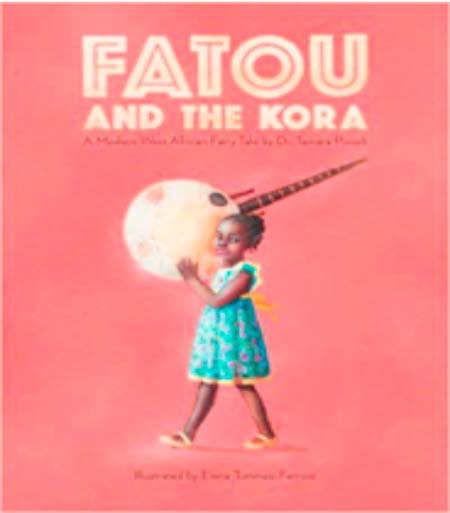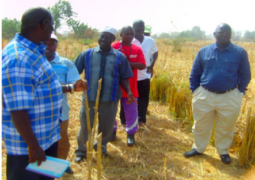
(Friday 18 October 2019 Issue)
This brightly coloured and cheerful picture book tells the story of what happens when Fatou, daughter of the tailor in a Gambian village, sets off to fetch water for the evening meal. As she goes she is waylaid by various friends who have gifts and messages for Fatou to take for her mother. As the gifts pile up in Fatou’s arms, and the messages for her mother crowd her head Fatou, somehow, forgets to get any water!
Fatou
has a lovely bright smile, and the crowded pictures give a real flavour of
village life in The Gambia. There are lots of colourful fabrics to see, and fun
things to look at on Fatou’s way to the well. I liked the repetition of
everyone calling out Fatou’s name to attract her attention and give her another
gift in return for some favour her mother has done for them. Each call is
different in some way, and the text increases in size encouraging the reader to
really shout out FATOU!
Fatou
is a simple, heartening story set in a vividly depicted rural environment. The
rhythm of the narrative, with its richly modulated refrain of gratitude and
gift-giving, each repetition involving a new, colourful garment and foodstuff,
proved a real delight to the young readers who shared this book. A reassuring
read - we have all made mistakes in life, adults and children alike, and there
is always a way to put them right. The story is charming and warm, having at its
heart lessons about giving and receiving. It finishes on a high note of humour
when after a wonderful feast using ingredients from the unexpected collection,
the family need yet more water and wonder who to send to fetch it this time.
This
book is a wonderful journey with amazing illustrations. The pictures are alive
with colour and a strong sense of life in a Gambian village. It is entertaining
and vividly educational without effort.
Another gorgeously illustrated book which tells the inspiring story of five women who creatively dealt with their village’s plastic trash problem. Despite limited resources and ridicule, Isatou and her friends persevered for more than a decade, eventually realising economic empowerment through their recycled plastic purse project. The book also includes bonus information such as a Wolof language glossary, timeline of actual events, and photos of the women of Njau. This beautiful story shows how one person’s actions can make a difference in the world.
Mangoes
and Monkey Bread by Emily Joof
Ella
and Louis have just arrived in The Gambia for their winter holidays. Settling
at home, Louis is already missing sweet strawberries from Stockholm. So Ella
takes her brother on a yummy fruit tasting tour and they discover fruits native
to West Africa, not just mango, but kabba, koni, solomsolom, and many others.
Illustrated with gorgeous drawings as well as photos of the fruits themselves
taken by Lena Nian.
This is a light-hearted journey of discovery with beautiful illustrations and photographs and it reminds us all of the joys of local fruits in childhood.
This
is a modern West African fairy tale set in Dakar. Fatou flouts convention and
starts to learn to play the kora, in spite of her father saying that was not
the tradition for girls to play. She practises every afternoon while her father
is having a nap, and eventually her father finds her playing the most beautiful
music and believes she is an angel in the form of his daughter. When he
realises it is in fact his daughter playing he tries to forbid her from
playing, but she tells him it is her gift and with the help of the butterflies
and the fairies he recognises that this is the truth.
This
is another book full of beautiful images and colours, with touches of magical
and spiritual thinking. The story challenges some old traditions about the role
of young women in griot families and reminds us of the power of music.
Read Other Articles In Article (Archive)
Witness subpoenaed in journalist’s trial
Apr 16, 2014, 9:53 AM




